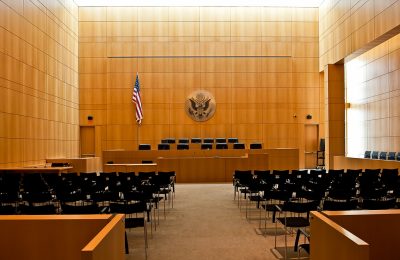Due Process and the Courts
What does the constitution say about due process?
The Fifth Amendment to the Constitution says clearly that no person shall be deprived of life, liberty, or property without the due process of law. Note that this says person, not citizen, and over the years the Supreme Court has consistently ruled that the Due Process Clause applies to all people in the United States.Do non-citizens have the right to due process in the U.S.?
Yes. The Constitution guarantees due process rights to all "persons," not just citizens. This means non-citizens, including undocumented immigrants, are entitled to fair treatment under the law. This includes the right to defend themselves in court. But recent Trump administration policies that speed up deportations and limit access to legal representation make it harder for non-citizens to get their fair day in court.- Access to legal representation Access to legal counsel is an essential part of our justice system and our democracy. In the criminal justice system, anyone facing even one day in jail gets a lawyer if they can't afford one. But immigrants facing deportation usually don't get that chance.The research is clear – the most effective way to ensure some level of due process for people navigating our complicated immigration system is for them to have trained attorney at their side. But Trump administration is now working to strip attorneys from as many people as possible, all in the name of increasing its deportation numbers. This attempt to eliminate basic due process will hurt people who already have few options.
- Fair day in court Due process guarantees that individuals have the opportunity to defend themselves in court. This includes non-citizens facing deportation.
Why is due process important?
We are seeing right now the importance of due process when it comes to President Trump's actions to carry out the so-called Alien Enemies Act, a 1798 wartime law that permits people to be deported outside of the normal framework of immigration law. President Trump has alleged that this law allows him to simply point at any person, declare them to be an alien enemy, and kick them out of the country without ever having a chance to see a judge. Thankfully, the Supreme Court said that is not true, and in a unanimous decision, ruled that people can challenge the Trump administration's invocation of the Alien Enemies Act. That is why due process is so important, because it means that no person can be rounded up and sent to another country without a chance to go to court and make the government prove their case.How is the American Immigration Council working to protect due process?
- We serve thousands of individuals in immigration detention centers through the Immigration Justice Campaign, our initiative with the American Immigration Lawyers Association. The Justice Campaign provides free legal services for immigrants who would otherwise have to navigate our complicated immigration system without a lawyer.
- We use the courts to demand a fair process for immigrants. Our litigation team is fighting back against the Trump administration’s blatant disregard for due process including filing a lawsuit challenging their illegal detention of immigrants in El Salvador’s notorious Terrorism Confinement Center (CECOT).

Five Things to Know About the Texas Court Decision on Immigration Action
Late last night, Judge Andrew S. Hanen, a federal district court judge, issued a decision in the lawsuit brought by Texas and 25 other states challenging President Obama’s new deferred action initiatives. In his decision, he issued a “preliminary injunction,” meaning that he temporarily blocked the implementation of the expanded… Read More

Texas Decision at Odds with Legal Precedent, History and Facts on Immigration Enforcement
Washington D.C. – Late last night, a Texas judge issued a preliminary injunction that temporarily blocks the implementation of President Obama’s new deferred action initiatives. These initiatives, announced last November, came in response to more than 10 years of political stalemates and failure by Congress to address America’s broken immigration… Read More

Unrepresented Children Still Being Fast-Tracked Through Immigration Hearings
Since the government began “prioritizing” the deportation of unaccompanied children and mothers with children last summer, legal service providers and other court observers across the country have reported that immigration judges are giving children less time to find attorneys before moving forward in their cases. Now, children without attorneys… Read More

Why Are Immigration Court Hearings Being Set Into 2019?
The immigration court system in the United States is being stretched to the breaking point. Immigration courts have long been expected to do more and more work without the additional funding or personnel needed to do the job effectively. But now, the courts are struggling to handle newer cases… Read More

Second Circuit Narrowly Interprets Aggravated Felony Bar Under INA § 212(h)
Washington, D.C.—Recently, the U.S. Court of Appeals for the Second Circuit issued a precedent decision that will allow a greater number of lawful permanent residents (LPRs) to avoid deportation if they can demonstrate to an immigration judge that their removal will result in… Read More

When is Possession of a Sock a Deportable Offense?
Last week, the Supreme Court heard oral arguments in Mellouli v. Holder, No. 13-1034, a case that shows just how out of step immigration enforcement has become. Moones Mellouli was a conditional lawful permanent resident engaged to a U.S. citizen and resided in the U.S. for 8 years,… Read More

U.S. Education of Foreign Students is Under Attack
Under the guise of protecting American workers, immigration restrictionists are trying again to prevent foreign students from having an opportunity to gain meaningful practical experience in the United States through a lawsuit against the Department of Homeland Security filed in March 2014 and brought, in part, by the Immigration… Read More

Top Five Immigration Stories of 2014
This year, the narrative on immigration swung from hope that the House of Representatives would follow the Senate’s lead and act on comprehensive immigration reform legislation to hopelessness when Republican leaders refused to act. Then attention turned to anticipation of the President’s announcement of temporary executive actions to… Read More

Immigration, Civil Rights and Labor Groups Join Legal Effort to Defend Immigration Action
Washington D.C. – Today, immigration, civil rights and labor groups joined the legal effort to defend President Obama’s recent executive action on immigration by filing an amicus “friend of the court” brief in the case, State of Texas vs. United States. In the days after the President’s… Read More

U.S. District Court in D.C. Hears First Arguments Against Executive Action on Immigration
Washington D.C. – Today, the U.S. District Court for the District of Columbia heard oral arguments in the case brought against executive action by notorious Maricopa County Sheriff Joe Arpaio, who is seeking to enjoin the DACA and DAPA programs based on the increased burden on his law enforcement office… Read More
Make a contribution
Make a direct impact on the lives of immigrants.
